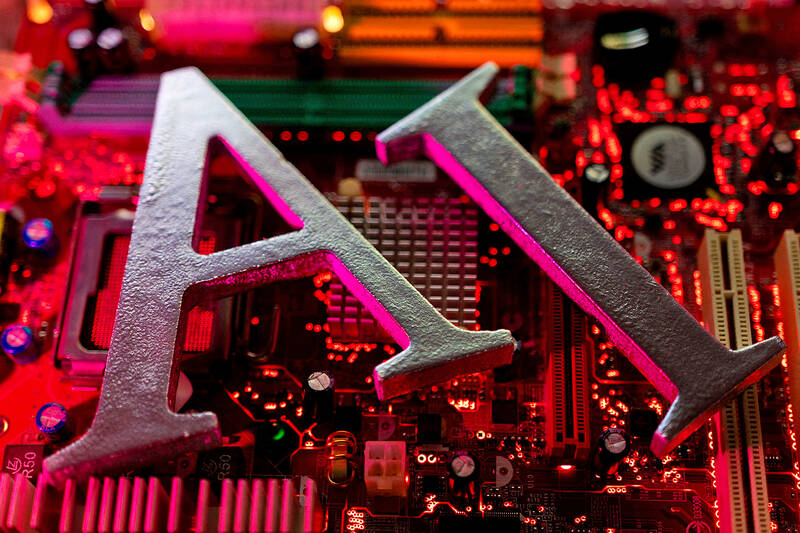Artificial intelligence (AI) executives at Intel Corp and Naver Corp yesterday touted the importance of forging a united front to counter Nvidia Corp’s dominance in the AI chip market.
Santa Clara, California-based Intel and South Korea’s biggest Internet company are teaming up to expand the open-platform software ecosystem based on Intel’s AI accelerator Gaudi. The two are part of a growing list of firms trying to loosen Nvidia’s dominance on the sector as it gets harder to secure graphics processing unit (GPU) accelerators to train generative AI devices.
“The monopoly situation needs to change in order to grow the market’s own pie and address the AI gap that the GPU supply chain is creating,” Ha Jung-woo, head of Naver’s Future AI Center, said during Intel’s AI conference in Seoul.

Photo: Reuters
Ha is one of the people behind the development of Naver’s HyperClova X large-language models.
Intel and Naver recently agreed to set up an AI chip research lab open to some of the country’s top South Korean universities and start-ups.
“The collaboration with Naver is very important and very strategic because we share a similar vision about the importance of having a robust ecosystem in AI,” said Justin Hotard, Intel’s executive vice president, and general manager of data centers and AI.
Separately, Intel agreed to sell a stake in a venture that controls a plant in Ireland to Apollo Global Management Inc for US$11 billion, helping bring in more external funding for a massive expansion of its factory network.
Under terms of the deal, the investment firm would take a 49 percent share of a joint venture that operates Intel’s Fab 34, the chipmaker said in a statement on Tuesday.
“The announcement highlights Intel’s continued progress in its transformation strategy,” the statement said. “The company continues to advance to create financial flexibility and accelerate its strategy, including investing in global manufacturing operations, while maintaining a strong balance sheet.”
It is the second such investment program that Intel has announced, part of an effort to lessen the burden on its already-stretched finances.
Intel said that construction of the plant, on an existing company site in Leixlip near Dublin, is “largely complete.”
The transaction, which allows Intel to invest elsewhere, would be completed in the second quarter of this year.
Fab 34 is to use Intel’s 4 and 3 manufacturing technologies.
In 2022, Intel announced a deal with Brookfield Infrastructure Partners LP to secure a US$15 billion commitment to help finance a semiconductor complex in Arizona.

DIVIDED VIEWS: Although the Fed agreed on holding rates steady, some officials see no rate cuts for this year, while 10 policymakers foresee two or more cuts There are a lot of unknowns about the outlook for the economy and interest rates, but US Federal Reserve Chair Jerome Powell signaled at least one thing seems certain: Higher prices are coming. Fed policymakers voted unanimously to hold interest rates steady at a range of 4.25 percent to 4.50 percent for a fourth straight meeting on Wednesday, as they await clarity on whether tariffs would leave a one-time or more lasting mark on inflation. Powell said it is still unclear how much of the bill would fall on the shoulders of consumers, but he expects to learn more about tariffs

NOT JUSTIFIED: The bank’s governor said there would only be a rate cut if inflation falls below 1.5% and economic conditions deteriorate, which have not been detected The central bank yesterday kept its key interest rates unchanged for a fifth consecutive quarter, aligning with market expectations, while slightly lowering its inflation outlook amid signs of cooling price pressures. The move came after the US Federal Reserve held rates steady overnight, despite pressure from US President Donald Trump to cut borrowing costs. Central bank board members unanimously voted to maintain the discount rate at 2 percent, the secured loan rate at 2.375 percent and the overnight lending rate at 4.25 percent. “We consider the policy decision appropriate, although it suggests tightening leaning after factoring in slackening inflation and stable GDP growth,”

Greek tourism student Katerina quit within a month of starting work at a five-star hotel in Halkidiki, one of the country’s top destinations, because she said conditions were so dire. Beyond the bad pay, the 22-year-old said that her working and living conditions were “miserable and unacceptable.” Millions holiday in Greece every year, but its vital tourism industry is finding it harder and harder to recruit Greeks to look after them. “I was asked to work in any department of the hotel where there was a need, from service to cleaning,” said Katerina, a tourism and marketing student, who would

i Gasoline and diesel prices at fuel stations are this week to rise NT$0.1 per liter, as tensions in the Middle East pushed crude oil prices higher last week, CPC Corp, Taiwan (台灣中油) and Formosa Petrochemical Corp (台塑石化) said yesterday. International crude oil prices last week rose for the third consecutive week due to an escalating conflict between Israel and Iran, as the market is concerned that the situation in the Middle East might affect crude oil supply, CPC and Formosa said in separate statements. Front-month Brent crude oil futures — the international oil benchmark — rose 3.75 percent to settle at US$77.01